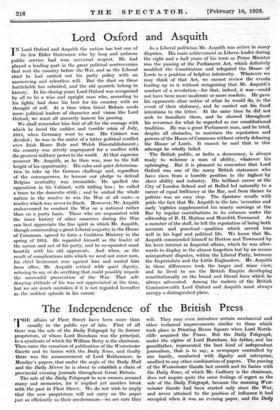Lord Oxford and Asquith
IN Lord Oxford and Asquith the nation has lost one of its few Elder Statesmen who by long and arduous public service had won universal respect. He had played a leading part in the great political controversies that rent the country before the War, and as the Liberal chief he had carried out his party policy with an unswerving and relentless will. But the dust on these battlefields has subsided, and the old quarrels belong to history. In his closing years Lord Oxford was recognized by all to be a wise and upright man who, according to his lights, had done his best for his country with no thought of self. At a time when Great Britain needs more political leaders of character and vision like Lord Oxford, we must all sincerely lament his passing.
We shall remember him first of all for the courage with which he faced the sudden and terrible crisis of July, 1914, when Germany went to war. His Cabinet was divided ; he was in the midst of a bitter political conflict over Irish Home Rule and Welsh Disestablishment ; the country was utterly unprepared for a conflict with the greatest military power in the world. At that supreme moment Mr. Asquith, as he then was, rose to the full height of his opportunity. His calm and quiet determina- tion to take up the German challenge and, regardless of the consequences, to honour our pledge to defend Belgian neutrality was irresistible. He quelled the opposition in his Cabinet, with trifling loss ; he called a truce to the domestic strife ; and he united the whole nation in the resolve to win the War at all costs—a - resolve which was never to flinch. Moreover, Mr. Asquith endeavoured to conduct the War on a national rather than on a party basis. Those who are acquainted with • the inner history of other countries during the War can best appreciate the fine spirit in which Mr. Asquith, though commanding a great Liberal majority in the House of Commons, agreed to form a Coalition Ministry in the spring of 1915. He regarded himself as the leader of the nation and not of his party, and he co-operated most heartily with his old opponents. And when, as the result of complications into which we need not enter now, his chief lieutenant rose against him and ousted him from office, Mr. Asquith retired with quiet dignity, refusing to say or do anything that could possibly impede the successful prosecution of the War. That self- denying attitude of his was not appreciated at the time, but we are much mistaken if it is not regarded hereafter as the noblest episode in his career. As a Liberal politician Mr. Asquith was active in many disputes. His main achievement as Liberal leader during the eight and a half years of his term as Prime Minister was the passing of the Parliament Act, which definitely modified the Constitution and relegated the House of Lords to a position of helpless inferiority. Whatever we may think of that Act, we cannot review the events leading up to it without recognizing that Mr. Asquith's conduct of a revolution—for that, indeed, it was—could not have been more moderate or more resolute. He gave his opponents clear notice of what he would do, in the event of their obduracy, and he carried out his fixed intentions to the letter. At the same time he did not seek to humiliate them, and he showed throughout his reverence for what he regarded as our constitutional tradition. He was a great Parliament man, and he tried, despite all obstacles, to maintain the reputation and powers of the House of Commons without utterly debasing the House of Lords. It cannot be said that in this attempt he wholly failed.
• The British public, as befits a democracy, is always ready to welcome a man of ability, whatever his upbringing. But it is pleasant to remember that Lord Oxford was one of the many British statesmen who have risen from a humble position to the highest by sheer ability and industry. His brilliant career at the City .of London School and at Banjo' led naturally to a career of equal brilliancy at the Bar, and from thence to politics was an easy step. The Spectator recalls with pride the fact that Mr. Asquith in the late 'seventies and early 'eighties supplemented his scanty earnings at the Bar by regular contributions to its columns under the editorship of R. H. Hutton and Meredith Townsend. As a member of the staff, he left the reputation of being both accurate and punctual—qualities which served him well in his legal and political life. We know that Mr. Asquith commended himself to Hutton and Townsend by his keen interest in Imperial affairs, which he was after- wards to display in the almost forgotten but by no means unimportant disputes, within the Liberal Party, between the Imperialists and the Little Englanders. Mr. Asquith in those differences took the larger and wiser view; and he lived to see the British Empire developing constitutionally on the broad and liberal lines which he always advocated. Among the makers of the British Commonwealth Lord Oxford and Asquith must always occupy a distinguished place.






































 Previous page
Previous page